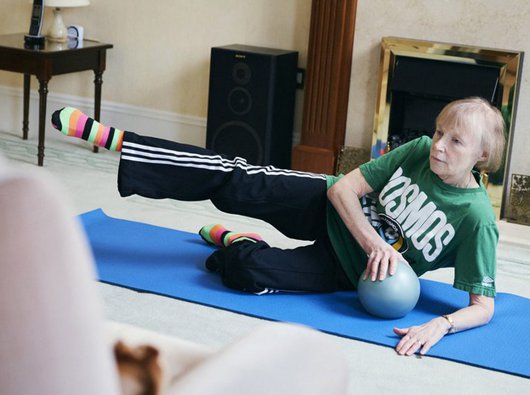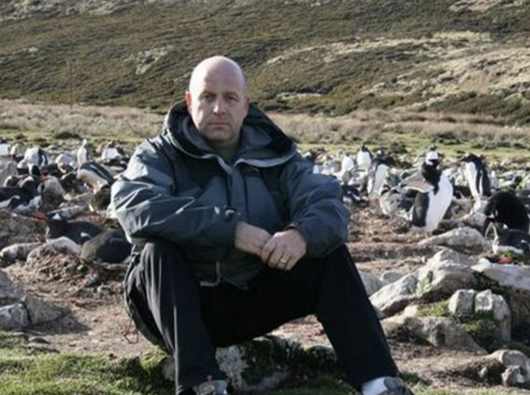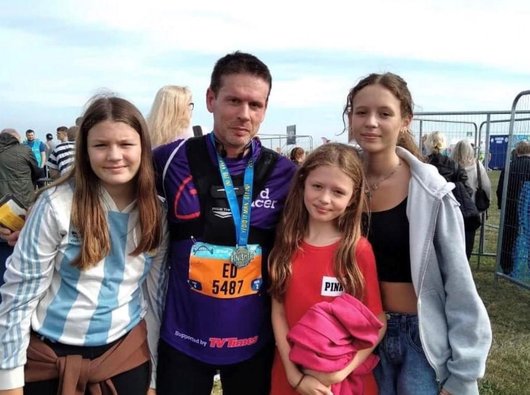Blood cancer and keeping active
It's important to look after your general health when you have blood cancer or are going through treatment. Here are some ideas on how you can keep active, including getting started and staying motivated.
Things you need to know
Whether you’re living with or after leukaemia, lymphoma, myeloma or any other type of blood cancer:
- Being active is safe – Just let your doctor or nurse know about your plans. They can tell you if there’s anything you’ll need to stop, start or keep in mind, based on your overall health and any treatment you’re having.
- It’s good for you – Being active improves your fitness and strength. It can help you recover from treatment, reduce fatigue and boost your mood and well-being.
- Anyone can get more active – You don’t have to go running or do high intensity workouts. Walking, gardening and DIY all count as exercise.
Staying safe
It is usually safe for most people to stay active before, during and after treatment for blood cancer. In fact, keeping fit and healthy may even help you cope with any symptoms and side effects.
We know that exercise can feel overwhelming when you’ve got lots of other things to worry about, especially if you’re trying to work, look after a loved one or cope with fatigue. Fortunately, you don’t have to commit to doing anything intense to make a positive difference. Staying active doesn’t have to mean going to the gym, playing a sport, or running a marathon. Small, everyday activities like gardening, walking, DIY and stretching all count.
It's a good idea to speak to your hospital team about any activities or exercises you want to try, even if you did them regularly before your diagnosis. They can tell you if there’s anything you need to start, stop or change about your plans, based on how the blood cancer or your treatment is affecting your body.
It’s also worth remembering that everybody is different, and you don’t have to do the same things as other people you know. It’s important to take your own circumstances into account – for example, if you’re fasting during Ramadan, it may be worth asking a doctor or your clinical nurse specialist (CNS) for additional advice about staying safe whilst exercising.
If your chosen activity involves being outside, wear sunscreen and choose sensible clothes and footwear.
You should also make sure you stay hydrated, and eat plenty of food so you have enough energy.
It’s normal to feel sore or achy after being active, but if you get dizzy, feel unwell or have any unusual symptoms, stop and speak to a doctor.
"Fresh air and gentle exercise can actually help lift my energy levels. It takes my mind off the fatigue, too. Pilates is my big thing – I've found video sessions online, which means I can do it from home when I can't get to my classes."
Read Erica's story about how she balances rest with activity to manage fatigue.

Tips for getting started
If being more active feels difficult or overwhelming, here are eight ideas to help get you started:
- Build up your strength first – Start with the basics, such as walking or doing some simple stretching. This will help increase your stamina and reduce the risk of injury.
- Use free exercise videos for people with blood cancer – Watch the videos further down this page, which have been created with a cancer exercise specialist and people living with blood cancer.
- Walking is good exercise – If you haven’t done much walking before, start with five or 10 minutes a day and slowly build it up. You might like to choose somewhere like a local park, where you can measure your progress each day and stop and take a rest if you need to.
- Try and do one simple activity every day – Anything that gets you moving counts. This could be walking around the block, stepping up and down, stretching, or doing some housework. Aim for 10 minutes, and continue on if you feel like it!
- Do something you enjoy, as you’re more likely to keep it up – If you're not sure what you might like, ask other people for recommendations. You could also see if there are any classes or groups in your local area that you could join - some of them may even offer free or low-cost introductory sessions.
- Make it social – This usually helps people stick to their plans. Find an exercise buddy (your partner, a friend, a neighbour) and follow a plan together.
- Get tips from other people with blood cancer – Join our online community and look for the thread "How I am trying to keep fit".
- Plan and record your achievements – Setting goals and ticking them off will motivate you to keep going. You could use pen and paper, a calendar, or an app – whatever you prefer and find easiest.
You might also like to watch our video with Lizzy, which has ten more tips for keeping active:
Keeping motivated
It can be hard to stick to a schedule if you’re feeling busy, overwhelmed or fatigued, even when you know that keeping active will make you feel better.
Your energy and activity levels might also change from day to day, for many different reasons. If you find it hard to stay motivated, remember:
- Go easy on yourself. It’s normal to have ups and downs. Listen to your body and don’t feel guilty if you can’t do as much as you usually do, or even anything at all. Resting is important too.
- Something is usually better than nothing. If you can manage to do an easy or short activity, count it as a win. Pushing yourself too hard won’t help in the long run, and it’s important to build up slowly if you’re not used to being active.
- There are mental health benefits. Moving your body can make you feel calmer, happier and less stressed, especially if you spend time outside. Try and do something active for just five minutes – if you’ve had enough after that, you can stop, but most people find they want to carry on. If you’re struggling with low mood or anxiety, you can also visit our mind and emotions page for suggestions that may help.
- Encouragement from others helps. Your family and friends could join you in your chosen activity, remind you to do it, or cheer you on. Or, you might want to share ideas and goals with other people with blood cancer in our online community.
- Keeping active doesn’t have to mean extra work. Think about how you could fit some activity into your usual routine, for example getting off the bus a stop early and walking the rest of the way home. Or, you could walk to meet a friend at a coffee shop and enjoy a rest and a catch up as well as ticking off your exercise for the day!
"Once I was home from the hospital, I started walking in the garden. Then I built up to walking down to the end of the road, then down to the village. Each day I just went a bit further."
Read Edward's story about building up his fitness after a back injury caused by myeloma.

Building up your fitness
If and when you’re ready to take things a step further, you might want to think about how to increase your daily activity. Find out what’s recommended for your age group – NHS UK has more information on what to work towards. As a general guide:
- Aim to do 20-30 minutes of general activity every day. This could include walking, running, or chores around the house and garden.
- Choose specific activities that keep your muscles strong, and try to do them at least twice a week.
- Cut down on the amount of time you spend sitting down if you can. When you are sitting, try to get up and move every so often, even just to get a drink, stretch, or make a phone call.
The websites We Are Undefeatable and OneYou have lots of activity ideas, or you can watch our videos in the section below.
Many people also recommend the NHS couch to 5k podcasts, which are a safe and accessible introduction to running if you’ve never tried it before.
"In many ways running has actually saved my life. It sounds dramatic but I really believe this to be true. It has had huge mental health benefits, and it’s helped me through some very dark periods."
Read Ed's story about how running helps him to cope with life's ups and downs.

Exercise videos for people with blood cancer
Whether you’re new to exercising or just want to try something different, you might like to follow along with these simple routines demonstrated by Anthea and Marion, who are both living with blood cancer.
The exercises will help you to move more, gradually build up your strength and find a level of regular activity that feels right for you.
More tools and support
Our keeping active information is aimed at everyone, whether you’re brand new to exercise or just need some ideas and encouragement to get back into it.
If you’re interested in reading more information about the benefits of exercise and fitness in general, as well as ideas on how to exercise safely when you have cancer, take a look at the following organisations:
You can also speak to your hospital team, who may have their own guidelines they can share with you.
Our Support Service nurses are also happy to answer any questions you have – find out how to contact us.
Funding disclosure
The following pharmaceutical companies have funded this information but have had no input into the content or direction of the project: Janssen-Cilag Ltd
Read about how we work with the pharmaceutical industry.
We would also like to thank Clinical Specialist Physiotherapist Bronagh McGoldrick for checking the accuracy of our information on this page.
Last reviewed May 2025. Next full review due May 2028. We may make factual updates to the information between reviews.

Share your story about living well
Your experience can help others with blood cancer
